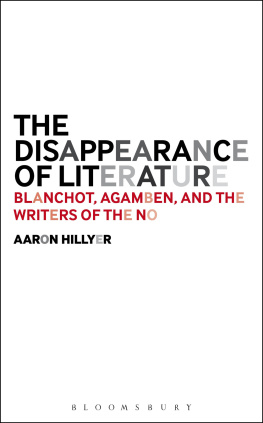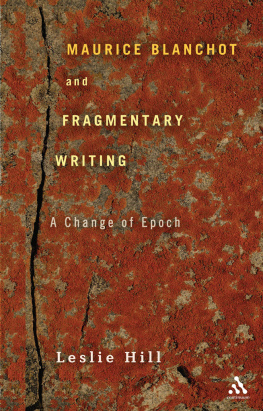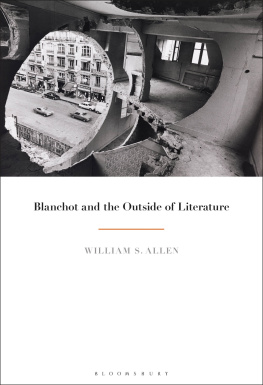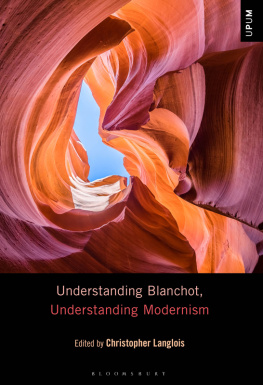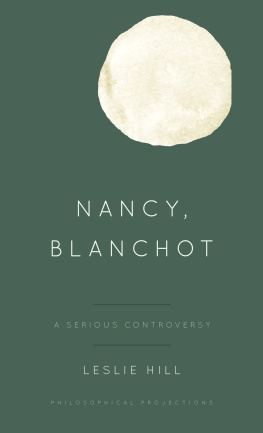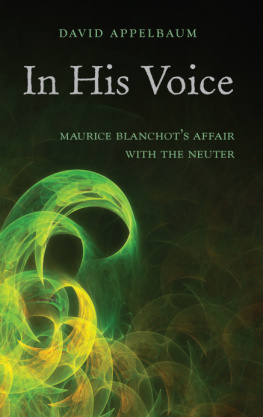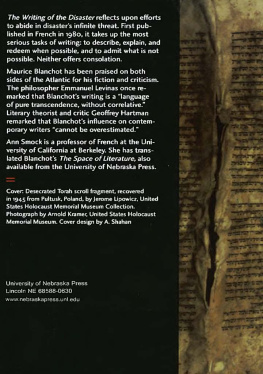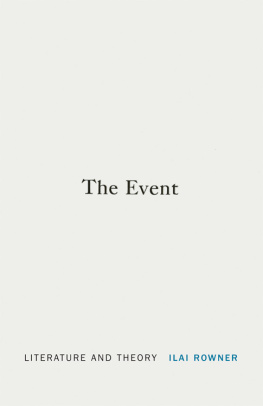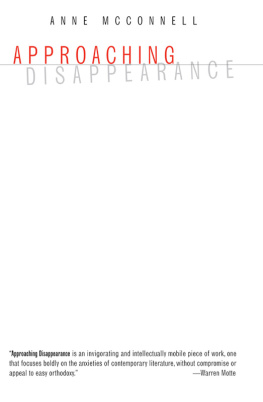The Disappearance of Literature
The Disappearance of Literature
Blanchot, Agamben, and the Writers of the No
Aaron Hillyer

Bloomsbury Academic
An imprint of Bloomsbury Publishing Inc
| 1385 Broadway | 50 Bedford Square |
| New York | London |
| NY 10018 | WC1B 3DP |
| USA | UK |
www.bloomsbury.com
Bloomsbury is a registered trade mark of Bloomsbury Publishing Plc
First published 2013
Aaron Hillyer, 2013
All rights reserved. No part of this publication may be reproduced or transmitted in any form or by any means, electronic or mechanical, including photocopying, recording, or any information storage or retrieval system, without prior permission in writing from the publishers.
No responsibility for loss caused to any individual or organization acting on or refraining from action as a result of the material in this publication can be accepted by Bloomsbury or the author.
Library of Congress Cataloging-in-Publication Data
A catalog record for this book is available from the Library of Congress.
ePub ISBN: 978-1-6235-6512-1
Typeset by Deanta Global Publishing Services, Chennai, India
In memory of Grandma Valora
Contents
Situation, The Non-Place of the Human, The Shadow and the Antidote, Technology and Resistance, Disappearance, Study
The Open, The Sacred and the Profane, Naked Life, Dsoeuvrement, Pataphysics, God, The Great Ignorance, The Teacher and the Student, Mysticism and Writing, The Land of the Magi
Survival, Bartleby, Inactivity, Image, Resistance of the Object, Invisible Man, Aesthetics, Intransmissibility, Para-Subject, The End of Storytelling, Beyond Good and Evil, Literature as Procedure, Asignifying Word, Mystery, Surprise, Dictator, Gestural Language, Self Slander, Then the time has come
Survival, The Student Before the Law, The Invisible Door, Study and Resistance, Educative Violence, The Autodidact, The Logic of Sovereignty, Closing the Door of the Law
Neutral Power, Near-death, Neuter, Void, Philopoesis, Linguistic Absolute, Collectivity, Superimposition, Dreams, De-quilting, Light, Awakening, Blindness, With What Words?
Pan Tolmeton, The Dance of Jealousy, Decreation, The FarNear
Irony, Style, Happiness
Friendship, That Light
It would have been even better if I had put into action the novel that went out into the street that I had proposed to a few artist friends. We would have really increased impossibilities in the city.
The Public would have seen our scraps of art, novelistic scenes unfolding by themselves in the streets, catching glimpses of one another among the scraps of the living, in old sidewalks, doorways, domiciles, bars, and the public would dream it saw life; it would dream the novel but in reverse: in this case, the novels consciousness is its fantasy; its dream the external execution of its themes.
Macedonio Fernndez
There is also, then, the riches of thought, there is the indigence that makes us feel that thinking is always learning to think less than we think, to think about the lack that thought also isand, speaking, how to preserve this lack by bringing it to speech...
Maurice Blanchot
My eyes are tired. For over half a century they have gazed into nullity where they have found a lovely nothing.
James Joyce
In his novel Bartleby and Co. Enrique Vila-Matas describes how Maurice Blanchot was tired of always hearing journalists ask writers the same two questions: One was: What are the tendencies in todays literature? The other: Where is literature heading? He later answered them anyway: Literature is heading toward itself, toward its essence, which is its disappearance. Bartleby and Co. is a sustained attempt to flesh out the meaning of this enigmatic claim. Among those Vila-Matas invokes in his quest is Giorgio Agamben, whose essay Bartleby, or On Contingency places him with Blanchot in the novels constellation of writers of the No, authors who, having lost all hope of an expressible, totality of words that signify wholly, eternally, and unequivocally, and of an accessible tradition, decide instead to build their work from a standpoint of extreme negativity, while still chancing that the literary words potential is not yet consumed.
Scholars are, of course, still asking the questions that tire Blanchot. Like Vila-Matas, those concerned with formulating them with regard to an immanent ontology have often turned to Blanchot and Agamben to navigate this increasingly In this zone of indistinction, Agamben and Blanchot glimpse a space of communication that they posit as literary, as well as ethical and political. Although each of the above-mentioned titles effectively approaches this place in a nuanced way by focusing on works by one of these two authors, what is still missing is an investigation of the relationship between them. My aim is to initiate this effort, to ask the tired questionwhere is literature heading?in a new way, by initially staging a confrontation between the two poststructural theorists that have most fully engaged it. The urgency of this investigation is underlined by the fact that the significance of a dispute between Blanchot and Agamben has gone mostly unnoticed.
Thomas Carl Walls book Radical Passivity is to my knowledge the most sustained consideration of the relationship between the work of Blanchot and Agamben, though it is not directly concerned with the literary question. Walls philosophical analysis shows how these two are aligned with Emmanuel Levinas in a common conception of radical passivity. He develops this insight by isolating this passivity in respect of what he deems to be the central concern of each writer: for Blanchot, it is passivity in regard to the image, for Levinas in regard to the Other, and for Agamben in regard to being-in-language. While this approach carries a certain reductive tendency, because Blanchot and Agamben at least have connected each of these concerns throughout their writings in prominent ways, it allows us to draw out the common ontological basis from which the three writers stage their interventions. One of the theses advanced by Wall is that Agambens work is an extension of the trajectories that Blanchot initiates in The Unavowable Community :
Through Blanchot, we come to Agambens notion of a community-to-come that is already in language and that is no longer graspable as sacrificed, recognized, and identified. Central to Agambens recent work is the notion of complete being-in-language without any residue. We believe therefore that his work unfolds from Blanchots la communaute inavouable , though Agamben seems to want to deny this.
Wall makes no further mention of this dispute with Agamben, not even to describe its basis, and proceeds to conflate Agambens work with Blanchots throughout the rest of the book. Such an unequivocal dismissal of Agambens objection to this conflation seems curious, especially given that one of Walls central claims is that Agamben is in some way an exemplary reader of Blanchot, so much so that his own work is an unfolding of potentials harbored by The Unavowable Community .
The first question I will take up in this book is the one that Wall does not pursue: why does Agamben seem to want to deny that his work on ontology and language congruently unfolds from Blanchots book? At the onset, it seemed that answering this question might, at the very least, illuminate the dispute between Blanchot and Agamben. Because Wall claims that the dispute arises in some way from an encounter with The Unavowable Community , a book inextricably bound up in the literary question, it also seemed possible that it could come to bear on my primary concern, which, like Vila-Matass, is to ask about the future of an immanent literature by studying those most engaged with its unfolding. Contra Vila-Matass fragmentary novelistic approach, which tallies the writers of the No with speed and brevity, the demands of this inquiry required us to abide in more sustained, though still fragmentary, encounters, as well as to register a group of new authors in this trajectoryVila-Matas himself, Anne Carson, and Csar Aira, among othersand also draw out a potent concept of study that allows them to effectively articulate the theme of disappearance at issue for Blanchot. Before we can approach these elements, however, it is necessary to begin to unpack the dispute that renders them intelligible in the way I propose.
Next page
